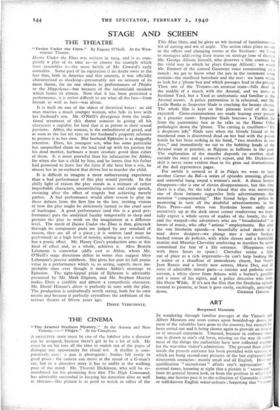AND SCREEN STAGE
THE THEATRE
4, Desire Under the Elms." By Eugene O'Neill. At the West- minster Theatre.
Desire Under the Elms was written in 1924, and is as com- pletely a play of its time as—to choose the example which least resembles it—the most brittle of Mr. Coward's early comedies. Some part of its reputation it no doubt owes to the fact that, both in America and this country, it was officially characterised as shocking—presumably not on account of its main theme, for no one objects to performances of Phedre or the Hippolytus—but because of the infanticidal incident which forms its climax. Now that it has been permitted a performance, it is rather difficult to see what all the fuss—from friends as well as foes—was about.
It is built on one of the oldest of theatrical bases : an old man marries a much younger woman, who falls in love with her husband's son. Mr. O'Neill's divergence from the tradi- tional treatment of this theme consists in giving all his characters a cupidity for land that is as potent as their sexual passions. Abbie, the woman, is the embodiment of greed, and as soon as she has set eyes on her husband's property schemes to possess it as her own. Her husband Ephraim is as doggedly retentive. Eben, his youngest son, who has some particular but unspecified claim on the land tied up with his passion for his dead mother, harbours a more resolute greed than either of them. It is more powerful than his infatuation for Abbie, for when she has a child by him, and he learns that his father had promised to leave her the farm if she bore him a son, he abuses her in an outburst that drives her to murder the child.
It is difficult to imagine a more embarrassing experience than a bad performance of this play would provide. In the chilly light of reason the play stands as a mixture of rather improbable characters, unconvincing actions and crude speech, straining after the effect of tragedy but achieving merely pathos. A bad performance would allow reason to play on these defects from the first line to the last, inviting visions of how the play might be deliciously turned to the cruel uses of burlesque. A good performance (and this is a good per- formance) puts the analytical faculty temporarily to sleep and permits the play to work on the imagination at a different level. The merit of Desire Under the Elms is that, gimcrack through its component parts are judged by any standard of reason, they are all of a piece ; it is written (and must be performed) at a high level of tensity, aiming at, not a realistic, but a poetic effect. Mr. Henry Cass's production aims at this kind of effect and, as a whole, achieves it. Miss Beatrix Lehmann is somewhat oddly cast as Abbie, whom Mr. O'Neill's stage directions define in terms that suggest Miss Lehmann's precise antithesis. She gives her part its full poetic value in a performance which is, as acting, superb, more im- probable than ever though it makes Abbie's marriage to Ephraim. The tight-lipped pride of Ephraim is admirably presented by Mr. Mark Dignam, and Mr. Stephen Murray makes Eben a credible and almost a sympathetic character. Mr. David Homan's decor is perfectly in tone with the play. The production is undoubtedly worth seeing, both for its own merits and because it perfectly crystallises the ambitions of the serious theatre of fifteen years ago.
DEREK VERSCHOYLE.






































 Previous page
Previous page